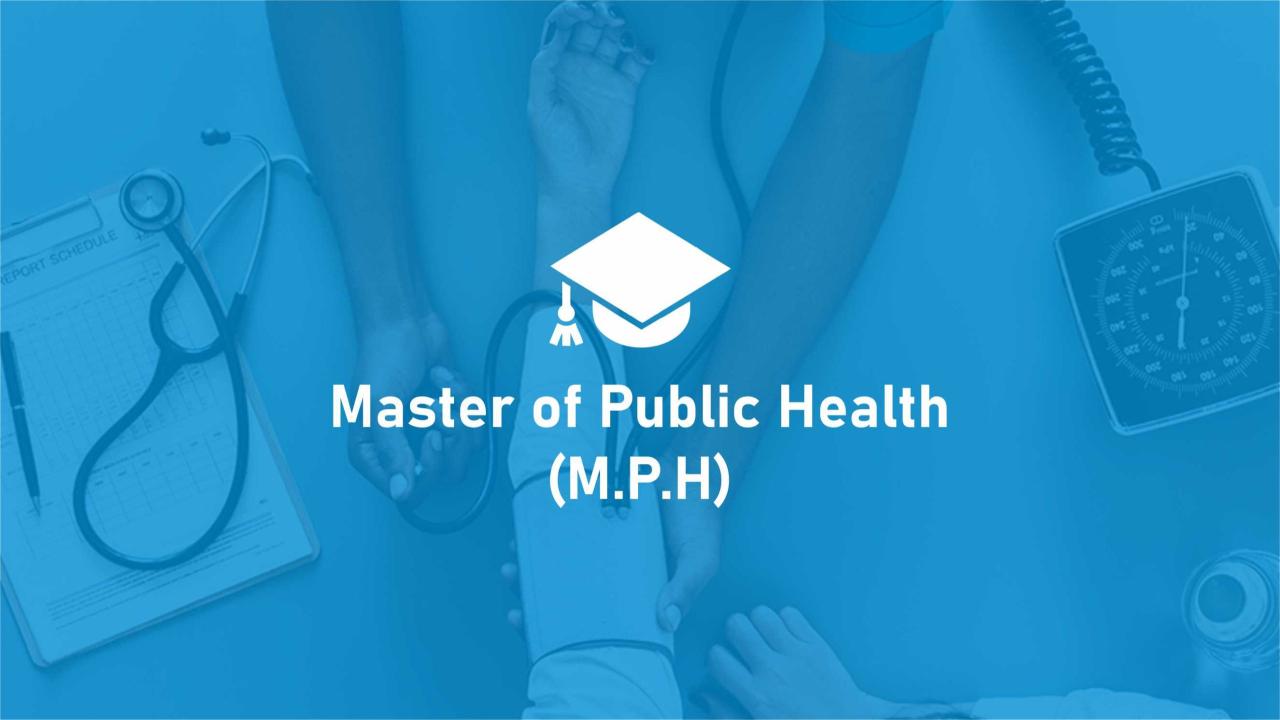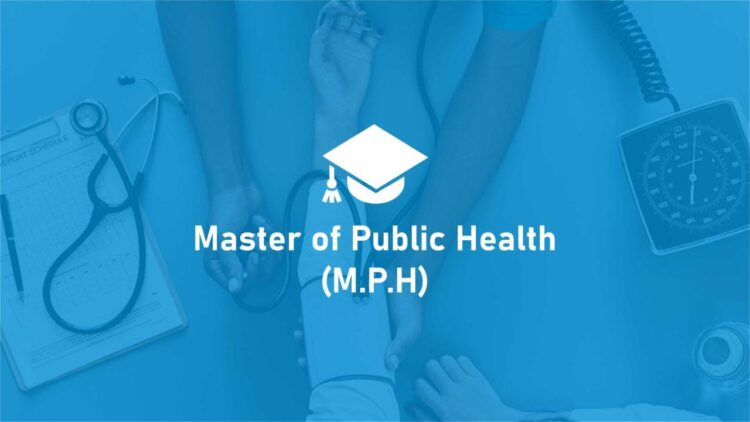
Master’s in Public Health Overview

A Master’s in Public Health (MPH) is a graduate-level degree that provides a comprehensive understanding of public health principles, practices, and research methods. It equips individuals with the knowledge and skills to address health issues at the population level.
Globally, the demand for MPH graduates has been steadily increasing. According to the World Health Organization (WHO), there is a shortage of over 2 million health workers, including public health professionals, worldwide. This demand is driven by growing health challenges, such as chronic diseases, infectious diseases, and environmental health issues.
Career Paths with an MPH Degree
An MPH degree opens up a wide range of career paths in public health. Graduates can work in various settings, including government agencies, non-profit organizations, research institutions, and healthcare facilities.
- Epidemiologist
- Public Health Analyst
- Health Educator
- Health Policy Analyst
- Global Health Specialist
- Environmental Health Scientist
Core Curriculum and Specializations
The Master of Public Health (MPH) curriculum provides a solid foundation in public health principles and practices. Foundational courses typically include:
- Biostatistics
- Epidemiology
- Environmental Health
- Health Policy and Management
- Social and Behavioral Sciences
Beyond the core curriculum, MPH programs offer various specializations that allow students to tailor their studies to their interests and career goals. Common specializations include:
Epidemiology
- Investigates the distribution and determinants of health-related states or events in specified populations.
- Involves designing and conducting studies, analyzing data, and interpreting results to understand disease patterns and risk factors.
Biostatistics
- Applies statistical methods to public health data to design studies, analyze results, and draw conclusions.
- Provides expertise in data collection, management, analysis, and interpretation.
Health Policy
- Examines the development, implementation, and evaluation of policies and programs aimed at improving public health.
- Involves understanding the political, economic, and social factors that influence health policy.
Environmental Health
- Focuses on the relationship between the environment and human health.
- Involves identifying and assessing environmental hazards, developing strategies to mitigate risks, and promoting healthy environments.
MPH programs also provide opportunities for research, allowing students to engage in hands-on projects that contribute to the advancement of public health knowledge.
Program Structure and Delivery
Master’s in Public Health (MPH) programs offer flexible learning options to cater to diverse student needs. They are typically available in three formats:
Program Types
- Full-time: Designed for students who can dedicate their full attention to their studies, typically completing the program in 1-2 years.
- Part-time: Accommodates students with work or other commitments, allowing them to complete the program over a longer period, typically 2-4 years.
- Online: Provides flexibility for students to learn at their own pace and location, often combining online coursework with on-campus experiences.
Program Duration and Coursework
The duration of an MPH program varies depending on the program type and the student’s pace. Full-time programs typically require 12-18 months of coursework, while part-time programs may take 2-4 years to complete. Online programs offer greater flexibility, allowing students to complete the program at their own pace.
Core coursework in MPH programs typically includes foundational concepts in public health, such as epidemiology, biostatistics, health policy, and program evaluation. Students also specialize in a specific area of public health, such as environmental health, global health, or health promotion.
Field Experiences, Internships, and Practicums
Practical experience is an integral part of MPH programs. Most programs require students to complete field experiences, internships, or practicums to gain hands-on experience in public health settings. These experiences provide students with the opportunity to apply their knowledge and skills to real-world public health challenges.
Career Advancement and Impact
An MPH degree opens doors to diverse career opportunities in public health, healthcare, and related fields. Graduates are equipped with the knowledge and skills to address complex health challenges and drive positive change.
MPH professionals play a vital role in shaping health policies, implementing health programs, and improving health outcomes. Their expertise is sought after in various sectors, including government agencies, non-profit organizations, healthcare providers, and research institutions.
Career Advancement Opportunities
- Epidemiologist
- Health Policy Analyst
- Program Manager
- Public Health Educator
- Health Communication Specialist
- Environmental Health Specialist
- Global Health Specialist
Successful MPH Graduates and Contributions
- Dr. Tom Frieden, former Director of the Centers for Disease Control and Prevention (CDC), led efforts to improve public health preparedness and response.
- Dr. Margaret Chan, former Director-General of the World Health Organization (WHO), advocated for global health equity and disease prevention.
- Dr. Raj Panjabi, founder of Last Mile Health, developed innovative healthcare delivery models for underserved communities.
Impact on Health Outcomes and Health Equity
MPH professionals have made significant contributions to improving health outcomes and promoting health equity. Their work in areas such as disease surveillance, immunization programs, and health education has reduced morbidity and mortality rates.
MPH professionals also advocate for policies and programs that address social determinants of health, such as access to affordable housing, education, and healthcare. By addressing these underlying factors, they help create a more equitable society where everyone has the opportunity to live a healthy life.
Global Perspectives and Challenges
The Master of Public Health (MPH) program equips graduates with a comprehensive understanding of global health issues and prepares them to address the complex challenges facing populations worldwide.
MPH professionals play a crucial role in international health organizations and development agencies, working to improve health outcomes in resource-limited settings and promote health equity across borders.
Ethical Considerations and Cultural Sensitivities
Working in global public health requires an understanding of the ethical considerations and cultural sensitivities involved. MPH graduates must be aware of the potential impact of their actions on local communities and respect diverse cultural practices and beliefs.
- Respecting local customs and traditions
- Considering the power dynamics and potential for exploitation
- Ensuring informed consent and community engagement
Emerging Trends and Future Directions
Public health practice and research are undergoing a transformative period, driven by technological advancements, data analytics, and artificial intelligence. These emerging trends are reshaping the field and presenting new opportunities for MPH professionals.
Technology and Data Analytics
The integration of technology and data analytics into public health is revolutionizing disease surveillance, health promotion, and health equity. Real-time data collection through wearable devices, electronic health records, and social media provides unprecedented insights into population health trends. Advanced analytics techniques, such as machine learning and artificial intelligence, enable the prediction and prevention of health outcomes, the identification of risk factors, and the development of personalized interventions.
Artificial Intelligence
Artificial intelligence (AI) is rapidly transforming the healthcare landscape. In public health, AI is being used to develop diagnostic tools, analyze large datasets, and automate administrative tasks. AI-powered algorithms can identify patterns and trends that are invisible to the human eye, leading to more accurate predictions, timely interventions, and improved health outcomes.
Evolving Roles of MPH Professionals
These emerging trends are also influencing the roles of MPH professionals. MPH graduates are increasingly expected to possess expertise in data analysis, technology, and AI. They are also expected to be able to communicate complex health information to a wide range of audiences, from policymakers to community members. As the field of public health continues to evolve, MPH professionals will need to adapt and embrace these new technologies and approaches to effectively address the health challenges of the future.





